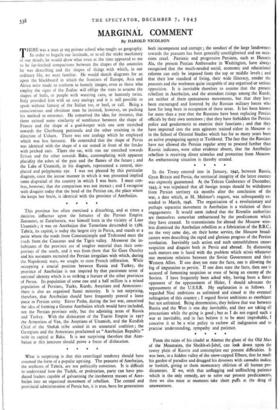This province has often exercised a disturbing, and at times
a decisive, influence upon the fortunes of the Persian Empire. Zoroaster, or Zarathustra, was himself born in the vicinity of Lake Ururnieh ; it was on Azerbaijan that Tamerlane descended in 1386. Tabriz, its capital, is today the largest city in Persia, and stands at a point where the roads from Constantinople and Trebizond meet the roads from the Caucasus and the Tigris valley. Moreover the in- habitants of the province are of tougher material than their com- patriots of the south, and it was from them that Sir Gore Ouseley and his assistants recruited the Persian irregulars with which, during the Napoleonic wars, we sought to stem French infiltration. While occupying a crucial position between Russia and Turkey, the province of Azerbaijan is not inspired by that passionate sense of national identity which is so striking a feature of the other provinces of Persia. Its population of some one and a half million is a mixed population of Persians, Turks, Kurds, Assyrians and Armenians: there is also an organised Sunni minority. It is not surprising, therefore, that Azerbaijan should have frequently proved a loose piece in Persian unity. Enver Pasha, during the last war, conceived the idea of forming a Greater Azerbaijan which would have included, not the Persian province only, but the adjoining areas of Russia and Turkey. With the dislocation of the Tsarist Empire in 1917 the Armenians of Van, the Assyrians of Urumieh, and the Kurdish Chief of the Shekak tribe united in an unnatural coalition ; the Georgians and the Armenians proclaimed an "Azerbaijan Republic" with its capital at Baku. It is not surprising therefore that Azer- baijan at this juncture should prove a focus of dislocation.






























 Previous page
Previous page